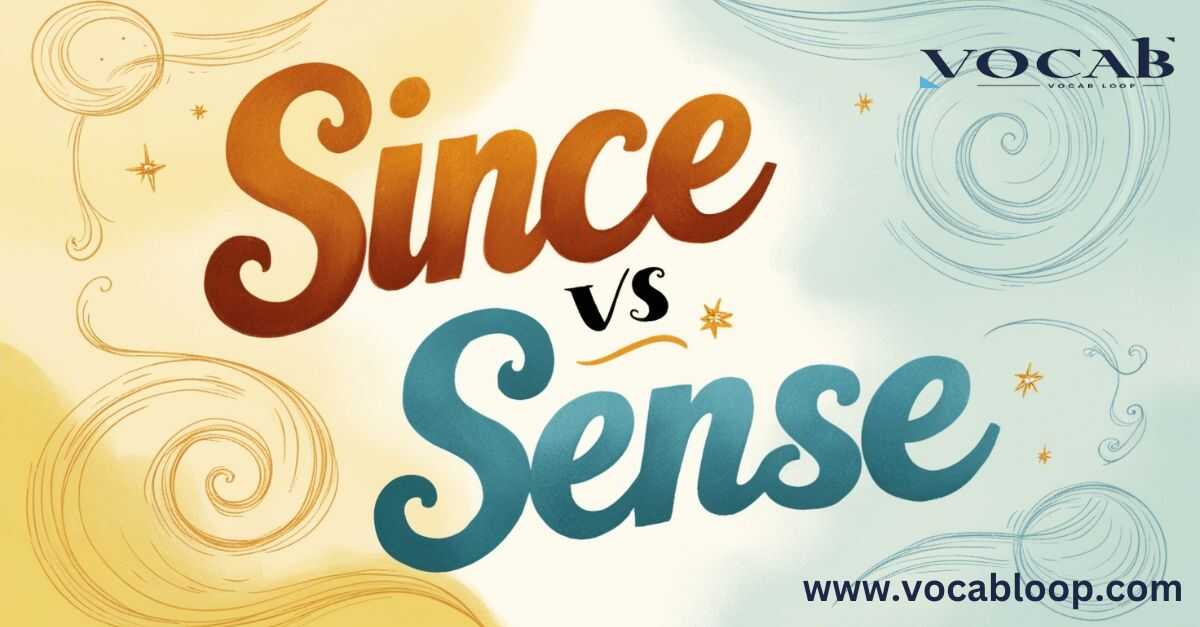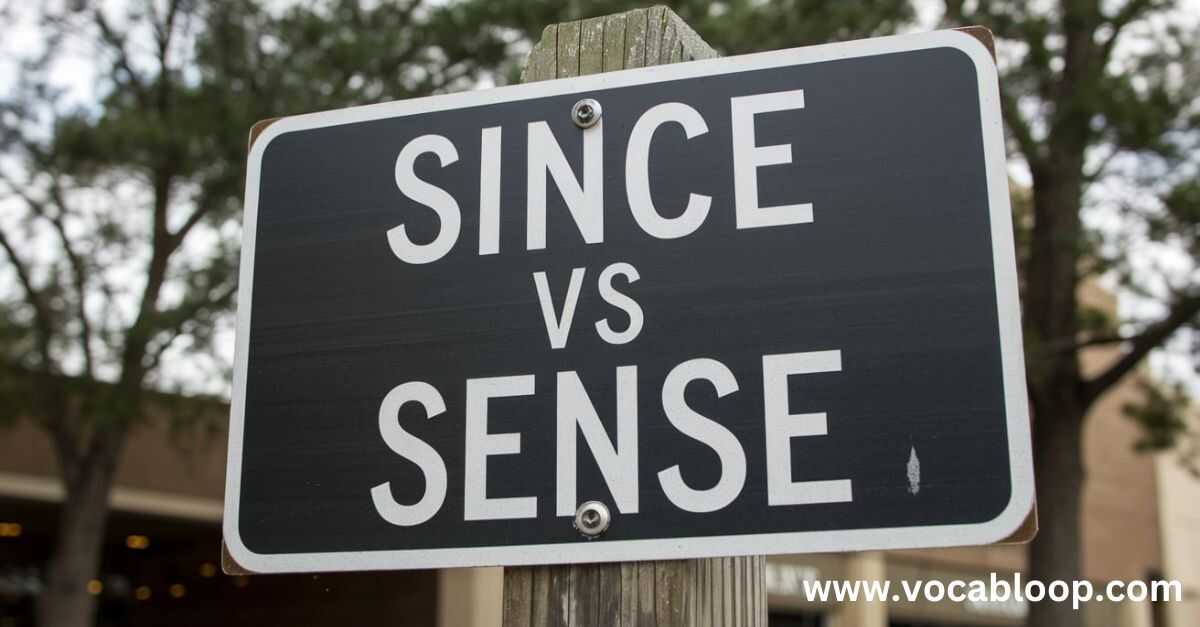In the vast landscape of the English language, certain word pairs stand out as particularly tricky. “Since” vs “sense” are two such words that often leave writers scratching their heads. While they may sound similar, their meanings and uses are worlds apart.
This comprehensive guide will help you navigate the nuances of these words, improving your writing clarity and confidence. Let’s embark on this linguistic journey and unlock the secrets of “since” and “sense”!
Since vs Sense
At first glance, “since” and “sense” might seem interchangeable to the untrained ear. However, these words serve distinct purposes in our language.
“Since” primarily deals with time and reason.
“Sense” relates to perception and understanding.
Consider this: You wouldn’t say “I’ve been waiting sense 2 o’clock,” just as you wouldn’t claim “That doesn’t make since.” These common hurdles in English usage can trip up even seasoned writers. But fear not! By the end of this article, you’ll confidently navigate these waters, wielding “since” and “sense” with precision and flair.
“Since” vs “Sense”: a deep glance

What does “Since” Mean?
“Since” is a versatile word that plays multiple roles in English. Its primary functions revolve around indicating time and indicating reason. Let’s break down its uses:
Since
As a conjunction:
- Temporal use: “Since” introduces a clause that specifies the starting point of an ongoing action or state. Example: “I’ve been learning Spanish since I moved to Barcelona.”
- Causal use: “Since” can also mean “because” or “given that,” introducing a reason for something. Example: “Since it’s raining, we’ll have to cancel the picnic.”
As a preposition:
“Since” can be used before a specific time or event to indicate the starting point of an action or state. Example: “He’s been a vegetarian since 2010.”
As an adverb:
In this role, “since” means “from then until now” or “in the intervening period.” Example: “She left town a year ago and hasn’t been back since.”
What are the sentence examples with “Since”? Since (Time and Reason):
- Time: “Since graduating college, Sarah has worked in three different countries.”
- Reason: “Since you’re feeling unwell, you should stay home and rest.”
- Combined: “Since the new policy was implemented last month, employee satisfaction has improved significantly.”
When to use the word “Since” in a sentence?
Use “since” when you want to:
- Specify the starting point of an ongoing action or state
- Introduce a reason or cause for something
- Indicate a point in time from which something has been happening continuously
How often is the word “Since” used in sentence?
“Since” is a common hurdle for many English learners, but it’s also a frequently used word in both spoken and written English. Its versatility makes it appear in various contexts, from casual conversations to formal writing.
What are the synonyms of “Since”?
- For temporal use: from, after, subsequent to
- For causal use: because, as, given that, considering that
What does “Sense” Mean?
“Sense” is equally versatile but in an entirely different way. It primarily relates to perception or feeling and understanding or judgment.
Sense
As a noun:
- Any of the five physical senses: sight, hearing, smell, taste, touch Example: “The sense of smell is particularly strong in dogs.”
- A feeling or awareness Example: “I had a sense that something was wrong.”
- Good judgment or practical wisdom Example: “It’s common sense to look both ways before crossing the street.”
- A meaning or interpretation Example: “In what sense did you mean that comment?”
As a verb:
- To perceive or become aware of Example: “I sensed his disapproval even though he didn’t say anything.”
- To understand or grasp Example: “Do you sense the importance of this decision?”
What are the sentence examples with “Sense”? Sense (Understandings and Feelings):
- Understanding: “It makes sense to start saving for retirement early.”
- Feeling: “There’s a sense of excitement in the air before a big concert.”
- Perception: “Cats have an acute sense of hearing.”
When to use the word “Sense” in a sentence?
Use “sense” when you want to:
- Refer to one of the five physical senses
- Describe a feeling or intuition
- Talk about understanding or good judgment
- Discuss the meaning or interpretation of something
How often is the word “Sense” used in a sentence?
“Sense” is a fundamental word in English, used frequently across various contexts. Its multiple meanings make it a versatile choice in both casual and formal language.
What are the synonyms of “Sense”?
- For perception: awareness, sensation, feeling
- For understanding: comprehension, grasp, insight
- For judgment: wisdom, reason, logic
How is the pronunciation of “Since” and “Sense”?

The similarity in pronunciation is one reason these words are often confused:
- “Since” is pronounced /sɪns/
- “Sense” is pronounced /sɛns/
The key difference lies in the vowel sound: “since” has a short “i” sound, while “sense” has a short “e” sound.
“Since” vs “Sense”
“Since” as a Time Traveler (or Reason Giver):
Think of “since” as your linguistic time machine. It helps you pinpoint when something started or why it happened. For instance:
- “I’ve been a vegetarian since 2015.” (Time)
- “Since you asked, I’ll tell you the truth.” (Reason)
“Sense” as Your Internal Compass:
“Sense,” on the other hand, is like your internal navigation system. It helps you perceive the world, understand situations, and make judgments. For example:
- “My sense of direction is terrible.” (Perception)
- “That decision doesn’t make sense to me.” (Understanding)
Comparison between “Since” vs “Sense”
| Aspect | Since | Sense |
| Primary Function | Indicates time or reason | Relates to perception or understanding |
| Part of Speech | Conjunction, preposition, adverb | Noun, verb |
| Example Usage | “Since yesterday, it’s been raining.” | “I have a sense that it might rain.” |
| Key Synonyms | Because, from, after | Feeling, understanding, judgment |
In British and American English “Since” vs “Sense”

Both “since” and “sense” are used similarly in British and American English. However, there might be slight differences in frequency or idiomatic expressions:
- British English: “I haven’t seen him since ages.” (informal)
- American English: “I haven’t seen him in ages.”
Words You Can Use in Place of “Since” vs “Sense”
To avoid repetition and enhance your writing, consider these alternatives:
For “Since”:
- Time: from, after, subsequent to
- Reason: because, as, given that
For “Sense”:
- Perception: awareness, feeling, intuition
- Understanding: grasp, comprehension, insight
Why are “Since” and “Sense” misused and interchangeably in English?
The confusion between “since” and “sense” stems from several factors:
- Similar pronunciation: The words sound very alike, especially for non-native speakers.
- Homophones in some dialects: In certain accents, these words may be pronounced identically.
- Unfamiliarity with usage: Learners might not fully grasp the distinct roles these words play.
Are “Since” and “Sense” in the most commonly misused English words?
While not at the top of the list, “since” and “sense” certainly rank among frequently confused word pairs. Other notorious pairs include:
- Their/There/They’re
- Your/You’re
- To/Too/Two
- Affect/Effect
What are the other similar Misused Word Pairs like “Sense” and “Since” in English?
English is full of word pairs that can cause confusion. Here are some examples:
- Accept/Except
- Advice/Advise
- Lose/Loose
- Weather/Whether
- Compliment/Complement
What are the things should a content writer consider in using the word “Since” and “Sense”?
Content writers should:
- Understand the context: Ensure the chosen word fits the intended meaning.
- Check for clarity: Verify that the sentence makes sense with the selected word.
- Consider alternatives: Sometimes, a different word might be more precise or effective.
- Be consistent: If using “since” for time, stick to that usage throughout the piece.
- Proofread carefully: These words are easy to mix up, so double-check your work.
Can content writers use “Since” and “Sense” in one sentence?
Absolutely! Using both words in a single sentence can actually help highlight their different meanings. For example:
“Since I developed a keen sense for design, my work has improved dramatically.”
Here, “since” indicates a starting point in time, while “sense” refers to an understanding or skill.
How do Content Writers use “Since” and “Sense” in their articles?

Skilled content writers use these words to:
- Establish timelines: “Since its launch in 2020, the app has gained over a million users.”
- Provide reasons: “Since customer feedback is crucial, we’ve implemented a new survey system.”
- Describe perceptions: “There’s a growing sense of urgency around climate change issues.”
- Explain concepts: “In a business sense, this decision makes perfect sense.”
Do Content Writers use “Since” and “Sense” in a wrong way?
Even experienced writers can sometimes misuse these words. Common mistakes include:
- Using “sense” instead of “since” for time: “I’ve been waiting sense 2 o’clock.” (Incorrect)
- Using “since” instead of “sense” for understanding: “That doesn’t make since.” (Incorrect)
Do Misused Words such as “Sense” and “Since” affect SEO and UX?
Absolutely! Misused words can significantly impact both Search Engine Optimization (SEO) and User Experience (UX):
- SEO Impact:
- Incorrect usage can affect the coherence of your content, potentially lowering its quality score.
- Misused words might not align with user search intent, affecting rankings.
- UX Impact:
- Errors can make content harder to understand, frustrating readers.
- Frequent mistakes may damage your credibility as a content provider.
Origins of “Since” and “Sense”

Understanding the etymology of these words can help differentiate them:
- Since:
- Derived from Old English “siþþan,” meaning “after that.”
- Originally a combination of “sīþ” (since, later) and “þan” (then).
- Sense:
- Comes from Latin “sensus,” meaning “feeling, meaning, perception.”
- Entered English through Old French “sens” in the 14th century.
Synonyms of “Since” and “Sense”
To further enrich your vocabulary, consider these synonyms:
Since:
- As a time marker: from, following, subsequent to
- As a reason indicator: because, as, given that, considering
Sense:
- As perception: awareness, sensation, feeling
- As understanding: comprehension, grasp, notion
- As judgment: wisdom, rationality, prudence
Conclusion
Mastering the distinction between “since” and “sense” is a significant step towards more precise and effective communication. Remember:
- “Since” is your go-to word for time and reasons.
- “Sense” is all about perception, understanding, and judgment.
By keeping these differences in mind and practicing their correct usage, you’ll enhance your writing clarity and avoid common pitfalls. Whether you’re a content writer, a student, or simply someone who loves language, this knowledge will serve you well.

Alex Hormozi is a seasoned blogger at Vocab Loop, known for his deep insights into language, vocabulary, and grammar. With years of experience in writing, Alex shares practical tips and effective strategies to help readers improve their linguistic skills and enhance their writing abilities.

